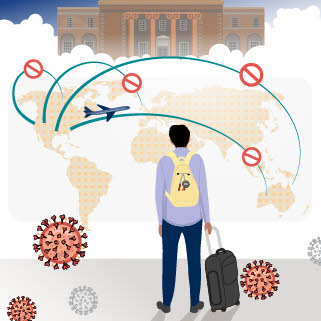article

Design by Tamara Rees using Adobestock/Porcupen image
Whether having to learn online in a distant time zone or spend weeks in quarantine with little more than an air mattress for company, American veterinary students attending schools abroad are facing an autumn like no other.
Roughly one-fifth of the more than 16,500 United States citizens studying veterinary medicine are enrolled at schools in other countries, according to the most recent data from the Association of American Veterinary Medical Colleges. Many of those countries are wary of the U.S.'s soaring COVID-19 caseload.
Outside of the U.S., 21 schools — in Australia, Canada, England, France, Ireland, Korea, Mexico, the Netherlands, New Zealand, Scotland and the West Indies — are accredited by the American Veterinary Medical Association.
Schools that were reached by the VIN News Service generally expressed enthusiasm about taking on foreign students who, in many cases, underpin their financial viability. However, governments have introduced an often-changing and sometimes-confusing assortment of travel curbs that range from slightly inconvenient to outright bans on entry.
The toughest restrictions are applied by nations with comparatively low COVID-19 infection rates, including Australia and New Zealand. Both have banned nonresidents from crossing their borders, forcing students stuck overseas to contemplate studying remotely or postponing their studies.
Other countries, including Canada, the United Kingdom and members of the European Union, are accepting foreign students but often with strings attached, especially for travelers from disease hotspots such as the U.S., Brazil and Russia. In Britain, for instance, travelers from the U.S. must self-isolate on arrival for 14 days or face a fine of up to £1,000 (US$1,310).
Whether restrictions exist, citizens of most countries are generally urged to avoid travel, while commercial airlines have cut back on long-haul services. Finding casual work overseas to help subsidize living costs has been made more difficult by spiraling unemployment, particularly in the global hospitality sector. Students also face the prospect of leaving loved ones behind in the U.S. at a time when their safety is at risk, if not already compromised.
Since its first COVID-19 case was recorded on January 22, the U.S. has reported more than 5.5 million cases and upwards of 174,000 deaths from the disease, the highest of all countries on both measures, according to a count kept at John Hopkins University. Cases of infection in the U.S. remain stubbornly high: 47,408 new cases and 1,356 deaths were logged on Thursday.
By contrast, European countries that applied strict lockdowns more uniformly than the U.S. have seen case numbers fall sharply, albeit with a recent uptick that shows the situation remains volatile. Canada, meanwhile, recorded just 217 new cases on Thursday. Australia and New Zealand, while both experiencing a recent bout of fresh cases, have gotten off relatively lightly so far.
In Canada, conditions apply
U.S. students hoping to head north of the border this fall recently received support from the Canadian government. On July 24, it said they could enter the country even if they hadn't obtained a study permit by a previous deadline of March 18. That doesn't necessarily mean they sail in unimpeded.
Allison Kiker

Photo courtesy of Allison Kiker
As a condition of returning to the University of Prince Edward Island in Canada, Allison Kiker had to self-isolate in her unfurnished apartment for two weeks, tapping a friend to be her "quarantine sponsor" and bring food and supplies.
Students must undergo a 14-day quarantine period immediately on arrival. They also must show that studying online from their home country is not an option due to poor internet infrastructure or the need to participate in crucial face-to-face learning activities. In addition, those Americans traveling to Canada without a valid study permit must bring a "port of entry letter of introduction" showing they were approved for a permit.
First-year students trying to enter Canada who only recently applied for study permits could be waiting a while for approval. "Due to the impacts of coronavirus disease, we can’t process applications normally and provide accurate processing times," the Canadian government says, adding that it's prioritizing certain applications, including those of returning Canadians, vulnerable people, and people who provide essential services, such as health care workers.
Allison Kiker, a 24-year-old veterinary student from New Jersey embarking on her second year at the University of Prince Edward Island Atlantic Veterinary College, had teed up an apartment to live in before she recently arrived in Canada. The arrangement, however, wasn't ideal for self-isolation: The apartment had no furniture. "So I had to bring up an air mattress and sleep on that for two weeks because I wasn't allowed to go furniture shopping," she said. Food and other supplies were delivered by a friend who served as Kiker's designated quarantine sponsor, a role required by the Canadian government.
The college is offering online-only learning for the first two weeks of its academic year, which begins Aug. 31, so students who must self-isolate won't miss classes, said Dr. Leigh Lamont, associate dean of academic and student affairs. An exception is fourth-year students, who began their final year in May, and in-person clinical rotations on July 6. About one-third of the college's students are international, all from the U.S. They must prove to the school in advance that they have a support system in place for their self-isolation period, although those who don't may request support.
The Université de Montréal Faculty of Veterinary Medicine confirmed that it is still receiving international students, including those participating in internships and residency programs. "However, study permits and visas are difficult to obtain at this time due to COVID-19 and immigration laws," Dr. Marie Archambault, school director, told the VIN News Service. Exchange students, she added, won't be accepted this year.
Archambault said 30% to 40% of postgraduate students at the veterinary school come from abroad, a handful from the U.S. Students having difficulty returning to Canada may defer their enrollment to next year, she said. "To aid these returning students, the registrar at the university will provide a document that says the students’ presence is essential for their study to help in the immigration process, but a study permit will still be required."
Kiker, who already had a student visa, said her border crossing en route to Prince Edward Island was pretty smooth. After showing her paperwork, she was told to drive straight to her off-campus apartment and not stop anywhere on the way. "If I needed gas, I had to get it at a self-service pump," she said. "I couldn't go near anyone."
Kiker isn't sure whether she'll visit home for Christmas; doing so would likely mean having to spend another four weeks in quarantine — two weeks in New Jersey, two more on returning to Canada. Feeling more separated from her family, she said, has been the worst part of the experience: Previously, her parents made the trip to the island with her, and family members would visit at least once a semester.
Caribbean schools take mixed approach
St. George's University School of Veterinary Medicine in Grenada will offer distance learning only this fall, including to the U.S citizens who make up 88% of its student body, according to the dean, Dr. Neil C. Olson. Fourth-year students attend clinical instruction at affiliated universities in the U.S., U.K., Ireland, Canada and Australia, and will continue to do so this year.
At Ross University in St. Kitts, students requiring in-person laboratory work may return to the island after a negative COVID-19 test upon departure from their home country and again upon arrival, a spokesperson said. Students will then be required to quarantine for 14 days and take another COVID-19 test before beginning instruction.
Down Under off-limits
Schools in Australia and New Zealand that responded to questions from VIN News confirmed that travel bans would make it difficult for students who currently are overseas to attend classes in person.
However, unlike in the Northern Hemisphere, the academic year in Australia and New Zealand began months ago — late February or early March — so many students were on campus when travel bans in both countries were introduced on March 20. A few are stranded, nevertheless.
Nicole Echeverri, a 26-year-old veterinary student in her second year at the University of Sydney, is stuck in Los Angeles. "I left Australia at the end of April as more of a personal decision to be with my family during these crazy and uncertain times," she said.
Nicole Echeverri

Photo courtesy of Nicole Echeverri
After leaving the University of Sydney to be with family in the U.S. as the pandemic unfolded this spring, Nicole Echeverri has been unable to get back into Australia to continue her veterinary studies in person.
Echeverri said the Australian government has rejected her requests for a travel exemption three times, along with requests from classmates also stuck abroad. "We have been in contact with our school, but there is little they can do for our return," she said. "While of course they want us back and I know they are doing everything they can, it is honestly hard being patient."
Another 26-year-old University of Sydney student from Los Angeles, Lauren Penney, is on campus now and doesn't know when she'll return to the States. "I was planning on being here until Christmas and going home for at least the holidays," Penney said. "My family would have liked to come visit me again, as well, but I'm pretty sure that's not going to happen." Penney had to cancel a trip to Thailand, where she was to participate in a student placement at an elephant sanctuary.
A University of Sydney spokesperson said international students make up 46% of its veterinary medicine student body, with 40% of those from the U.S. "The majority are currently in Australia, but a small number — including from the U.S. — have continued their studies from abroad," the spokesperson confirmed.
Whether the travel bans will be lifted by the next Australian and New Zealand academic year is an open question. The state of South Australia, which has a very low COVID-19 caseload compared with other Australian states, will in September allow 300 international students to attend its universities as part of a pilot program.
The Australian federal government indicated its support of international students in a July 20 announcement that it would start granting student visas in all locations outside the country. "This means when borders re-open, students will already have visas and be able to make arrangements to travel," it said. International students can now apply for another student visa free of charge if they were unable to complete their studies within the dates of their original visa due to COVID-19.
Like many institutions around the globe, universities in Australia and New Zealand are using a hybrid of online and face-to-face learning. An exception is the University of Melbourne, which has been forced to go online exclusively following the reintroduction of strict lockdown due to a second wave of infections. "The current stage-four restrictions in metropolitan Melbourne have meant we are delivering our first-, second- and third-year curriculum online, with essential face-to-face practical classes being delayed until later in the semester when restrictions are lifted," a spokesperson said.
Echeverri is hopeful that the pilot in South Australia might be applied in other Australian states, should their COVID-19 caseloads fall. She has found studying online does have advantages, such as enabling her to work at her own pace and thoroughly go through pre-recorded teaching materials. "It is a lot of work in a day, and getting used to the different time zone is hard sometimes [when] having late Zoom meetings, but it is worth it as long as I can progress in my degree," she said. "Overall, I am glad I chose to come home and don't regret my decision."
Another university cast doubt on whether online-only learning will be sufficient for students stuck abroad. The University of Queensland, known as UQ, said students enrolled in its veterinary medicine degree were expected to attend "essential face-to-face training that cannot be delivered through alternative (online) teaching."
A spokesperson said the university was providing advice directly to "the small number" of affected students about the completion of practical components. "This will include face-to-face, skills-based learning that can only occur once students are able to enter Australia and return to UQ campuses," he said. UQ was, in some cases, offering students studying online from their home country a
12.5% tuition rebate to recognize their inability to access on-campus facilities. Around 30% of UQ's veterinary student body are international, with U.S students accounting for around 5% to 10% of those.
At Massey University School of Veterinary Science in New Zealand, international students make up about a fifth of the student body, with around a quarter hailing from the U.S. Should the country's strict travel bans remain in place next year, the university is exploring options to offer international students online-only learning. "But there are some aspects, particularly practical/laboratories, that cannot be adequately replicated online, so these aspects will be competed when they return to New Zealand," a spokesperson said.
A smoother path to Europe
Americans wishing to cross the Atlantic are generally free to make the trip but, as in Canada, they must self-isolate on arrival.
Britain has dropped the self-isolation requirement for dozens of countries but not the U.S. The Royal Veterinary College in London has gone a step further than the U.K. government in requiring all international students, no matter from where, to self-isolate for two weeks. "The RVC is providing these students with various levels of support, including temporary, free accommodation, food and care packages during the transition period," a college spokesperson told VIN News.
The RVC will use a mix of face-to-face teaching and online learning in the upcoming term. International students make up about 35% of the student body; the U.S. accounts for 12% of those.
Another institution, the University of Edinburgh, acknowledged that some U.S. students won't be able to make it across the Atlantic. International students account for about 65% of its student body. Of those, 75% are from the U.S.
"We are aiming to ensure we stay connected as a student community, despite any travel restrictions, wherever our students are in the world," a university spokesperson said. The Scottish school will offer online welcome and induction activities for those who can't be there in September.
"Interest from overseas students in studying veterinary medicine at the university remains strong," the spokesperson said. "However, it is too early to say how many students will be able to begin their studies because of health, visa or travel restrictions."
Restrictions on entry by U.S. travelers to the European Union remain in place, although the European Council governing body, keen to support member states' education sectors, has offered an exemption to foreigners "travelling for the purposes of study." Notably, the European Council's recommendations are not legally binding, and quarantine and testing requirements are outside its scope. Decisions are up to its member states.
Universities in the EU with veterinary programs accredited by the AVMA are University College Dublin in Ireland, VetAgro Sup in France and Utrecht University in the Netherlands.
Foreigners entering France from the U.S. are still required to self-isolate for 14 days on arrival. In June, however, the French government expressed particular enthusiasm for welcoming foreign students "regardless of their country of origin." Student requests for visas and residency permits would be "given priority," the French government said. Ireland, too, has opened to foreign students, including Americans, provided they self-isolate for 14 days.
In the Netherlands, an exception from travel bans has been made for "well documented" students in possession of a study-type residence notification letter from the Dutch immigration department. "If it is not possible for the student to enter the Netherlands at this stage, they can start their studies from home through online education," a Utrecht University spokesperson said, adding, "Exchange students cannot come to our clinics in the coming term, as all spots are filled by degree students. We hope they can start coming again in the second term."